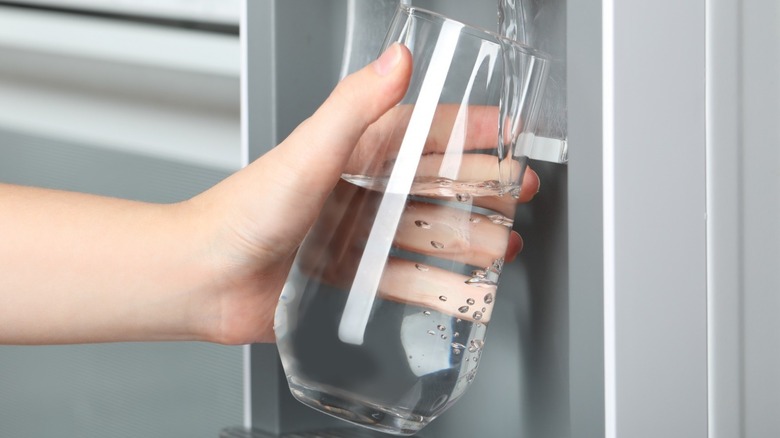New Study Reveals How Drinking Enough Water Could Help Your Heart
Some people take the simple act of drinking water regularly for granted. In fact, a 2018 survey by Quench USA showed that 77% of working Americans don't drink enough water on a daily basis. While drinking plain water may not seem appetizing, there is no denying that our bodies need us to drink enough water every day to accomplish many basic tasks. Regulating body temperatures, making nutrients accessible, and cleaning out insides are just a few of the important functions water helps the human body accomplish, per Mayo Clinic Health System.
Researchers at the National Heart, Lung and Blood Institute are now pointing to new findings that show how water also plays a role in cutting the risk of developing heart failure, per Science Daily. The study's lead author, Natalia Dmitrieva, compares the impact of drinking more water with the act of cutting back on sodium, saying "Similar to reducing salt intake, drinking enough water and staying hydrated are ways to support our hearts and may help reduce long-term risks for heart disease." The researchers reached these conclusions after analyzing data from medical visits of more than 15,000 adults between the ages of 45 and 66 over more than a 25-year period.
Serum sodium levels are a key to heart health
Science Daily reports that researchers for this particular study looked at levels of serum sodium in middle-aged adults and found that those with levels at 143 milliequivalents per liter had a 39% higher chance of developing heart failure than those whose levels were lower. They also surmised that a person's possibility of developing heart failure increased by 5% when serum sodium levels rose by just 1 milliequivalents per liter. The average level of serum sodium is between 135 and 146, which means a person with a "normal" amount is a potential candidate for heart failure.
While scientists are cautioning that further tests within a randomized, controlled trial might be necessary to validate these findings, hydration's importance to heart health has been known for some time. Earlier studies showed that people with higher serum sodium levels experienced problems with their left ventricle, which is the heart's most important pumping chamber, per Everyday Health. The findings, which were reported in August 2021, were enough to prompt Cleveland Clinic cardiologist Maria Mountis not just to drink more water, but to limit salt intake too.
Science Daily's researchers recommend women drink 1.5-2.1 liters and men ingest 2-3 liters of water every day.

